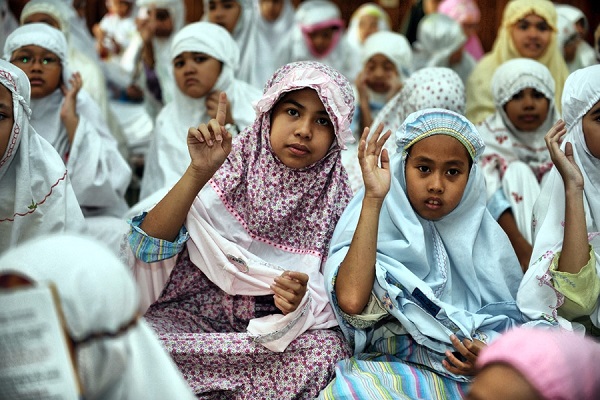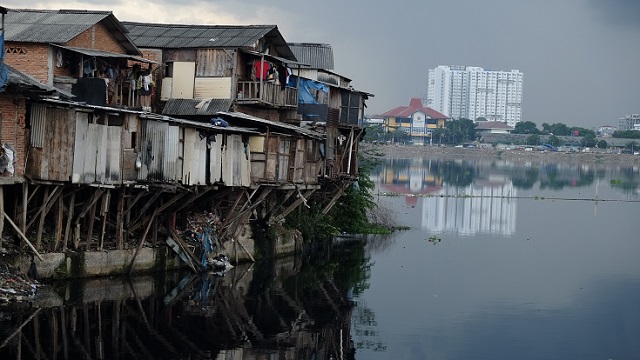Ron Witton
Occasionally one comes across a book that cogently addresses an intellectual problem that has been bothering one for some time. Merle Ricklefs’ Islamisation and Its Opponents in Java is such a book. I first visited Indonesia in 1962 and have returned regularly over the decades. During that time I have noticed the country’s increasing Islamisation visible in a number of day-to-day observations: from more and more Indonesian women wearing headscarves to the fact that Islamic greetings/prayers are increasingly said at the commencement of seminars and public occasions. I have wondered why this is occurring and what it means for Indonesia.
Java, with a vast population of some 130 million, is both the site of the national capital and has played a defining role in Indonesian history and society. Like many students of Indonesia, I learnt about Java through the analysis developed by Clifford Geertz in his Religion of Java. This study saw Javanese society as being made up of three components: the priyayi, a thin top layer who were the aristocracy; the santri, or pious Muslims, often associated with the world of commerce; and the abangan, by far the majority of Javanese who, albeit being Muslim, drew on Java’s heritage and had a syncretic view of the world that expressed itself through wayang with its Hindu epics and through mysticism.
My observations of the increasing Islamisation of Java seemed at odds with Geertz’ analysis which had always been presented as a somewhat immutable characterisation of Javanese society. Ricklefs with his vast historical knowledge of Java (this being his third volume of a history of Java), posits that Geertz’s observations were historically contingent to the last century of colonial rule. Ricklefs documents the way that the divisions Geertz identified succumbed to change in the face of the Japanese occupation, the revolution, the convulsions of change arising from constitutional democracy, Sukarno’s Guided Democracy, the bloodbath that ushered in the thirty years of Suharto’s authoritarian government, and the last twenty years’ succession of democratically elected governments.

Ricklefs does not restrict his observations to Java but has much to say about Indonesia in general. Of particular relevance is his examination of the influence of modernity and international (particularly Salafi/Wahabi) tendencies whereby notions of individual freedom succumb to a particular interpretation of justice that stems from authoritarian and religious control of society.
The book includes detailed research on the social and political impact of Islamisation in Java and indeed in Indonesia.
Ricklefs describes the current Islamist agenda in Indonesia as concerned with:
‘influencing, infiltrating and taking over state, semi-state and civil society organisations, in which they are having considerable success. …Dakwahism [proselytism] continues powerfully at grass-roots level, supporting deeper Islamisation in all its forms.’
Recent developments in Indonesia provide any number of examples of this shift. Perhaps the most dramatic manifestation of this was the defeat of Basuki ‘Ahok’ Tjahaja Purnama in the 2017 Jakarta gubernatorial election as a result of a contrived and vicious Islamist propaganda onslaught, which resulted in his being jailed for blasphemy. In July 2016 mobs burned and ransacked at least 14 Buddhist temples throughout Tanjung Balai, a port town on Sumatra, following reports of a complaint by Meiliana, a Chinese Buddhist woman, about a mosque’s noisy loudspeakers. Meiliana was charged with insulting Islam and in August 2018 she was sentenced to 18 months’ jail for blasphemy. In September 2018 authorities in the Bireuen district in the province of Aceh banned men and women from dining together unless they are married or related in order to ‘help women be more well behaved’. Elsewhere in Aceh there have been public whippings of people found guilty of a range of offences including homosexuality, gambling and drinking alcohol. Of similar concern is the role of the seemingly ill-informed and powerful Indonesian Ulema Council (MUI), which in August 2018 questioned whether such vaccines as those to prevent measles-rubella and polio are halal, resulting in a considerable undermining of public health programs.
President Joko Widodo’s choice of Ma'ruf Amin, a conservative Islamic cleric, to be his vice-presidential running mate in the 2019 presidential election, and the close association between Joko Widodo’s principal opponent Prabowo and the hard-line and often violent Islamic Defenders Front, provide cogent evidence in support of Ricklefs’ analysis. Indonesians are being asked to choose between these two Islamicist alternatives and this illustrates the increasingly pervasive hold that Islamism has on Indonesia’s political and social landscape.
A further strength of the book is that Ricklefs also makes comparisons with the contemporary Islamic and non-Islamic world, with reference to South and Southeast Asia and such countries as Iran, Saudi Arabia, Pakistan and Sudan, and with the broader international rise in religiosity.
There is much in the book that leads to both greater understanding of, and greater concern about, the world we live in.
MC Ricklefs, Islamisation and Its Opponents in Java: A Political, Social, Cultural and Religious History, c. 1930 to Present , NUS Press/University of Hawai’i Press, 2012.
Dr Ron Witton (rwitton44@gmail.com) has taught Social Science in Australian and Indonesian universities and now works as an Indonesian and Malay translator and interpreter.














